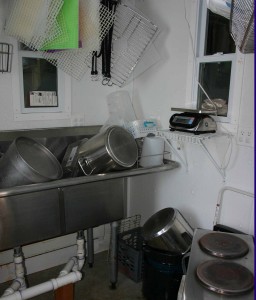
 Sarah Spring invited the Guild to visit her at her micro-creamery in Durham for our February meeting. Her house sits on a sunny rise on a back road and ably accommodate the large group that met there to discuss efforts to get Maine cheesemakers to participate in the ACS conference, info about current and future workshops, the importance of the upcoming Sanitation Workshop, and especially the fate of legally making raw milk cheeses while the state of Maine is trying to allow unregulated cheeses into the marketplace, and the Feds are thinking about scrapping any tolerance of unpasteurized dairy products. Needless to say there was much to talk about, and much to act on. Stay tuned.
Sarah Spring invited the Guild to visit her at her micro-creamery in Durham for our February meeting. Her house sits on a sunny rise on a back road and ably accommodate the large group that met there to discuss efforts to get Maine cheesemakers to participate in the ACS conference, info about current and future workshops, the importance of the upcoming Sanitation Workshop, and especially the fate of legally making raw milk cheeses while the state of Maine is trying to allow unregulated cheeses into the marketplace, and the Feds are thinking about scrapping any tolerance of unpasteurized dairy products. Needless to say there was much to talk about, and much to act on. Stay tuned.
 Below is a link to a PDF document outlining the basics for setting up a small scale dairy operation and then getting your Maine Dairy Processors license to allow you to sell your products. It was put together by the Maine Micro-Dairy Cooperative which, sadly, is no longer an on-going operation
Below is a link to a PDF document outlining the basics for setting up a small scale dairy operation and then getting your Maine Dairy Processors license to allow you to sell your products. It was put together by the Maine Micro-Dairy Cooperative which, sadly, is no longer an on-going operation